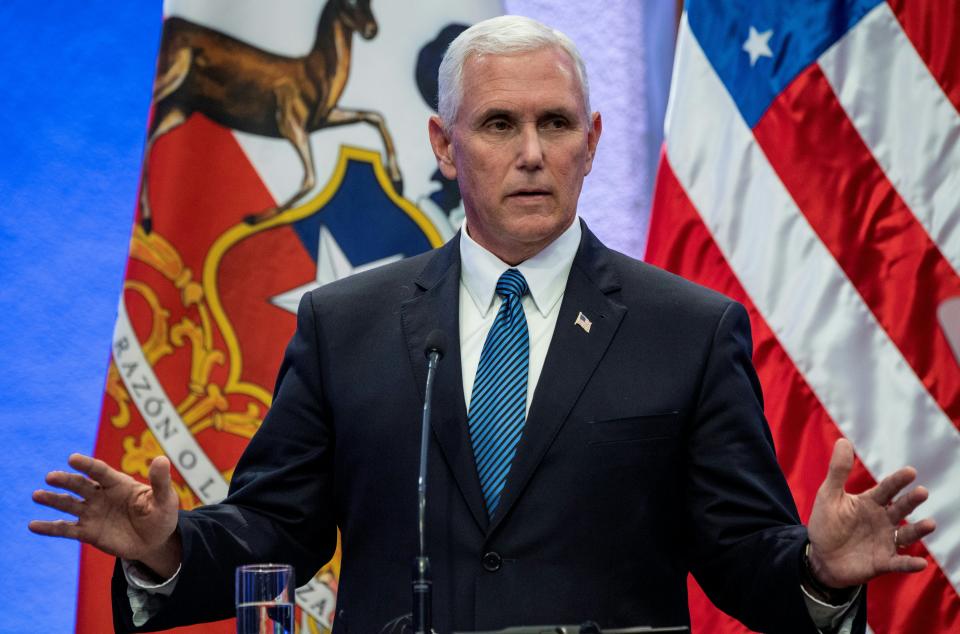What 'President Pence' would mean for markets
Not much rattles financial markets these days. But Michael Flynn’s guilty plea did, with stocks falling abruptly on news that President Donald Trump’s short-lived national security adviser admitted lying to the FBI, and may now provide new evidence of improprieties on Trump’s presidential campaign, and perhaps even at the White House after Trump took office.
This is the worst news Trump has received during his tenure so far, and it revives the prospect of a constitutional crisis that could involve Trump firing special prosecutor Robert Mueller. If that happens, it would be the gravest political scandal since Watergate in the early 1970s, with pressure mounting on Congress to impeach and convict the president. And if that actually happened, Vice President Mike Pence would replace Trump, becoming the 46th president of the United States.

We’re not there yet, and even if there were a move to remove Trump, he could survive it, given that fellow Republicans control both houses of Congress and a conviction in the Senate requires an imposing two-thirds vote. Still, markets are all about anticipating the future, and the prospects now include a new degree of political turmoil unprecedented even for the turbulent Trump administration.
If allegations of illegal activity involving contacts with Russian interests during the 2016 campaign get closer to Trump and his family, and Trump reacts by firing Mueller, it will undoubtedly unnerve markets. “The initial impact of that hypothetical would be a fairly significant hard stop on the psychology behind the rally we’ve seen in US equities,” says Peter Kenney, senior market strategist for Global Markets Advisory Group. “Investors have really grown to know what to expect from Trump.”
But an initial pullback might be the worst of it. The fundamental economy remains strong, and if Congress passes a big package of business tax cuts, as seems likely, that will put more wind in the economy’s sails. Meanwhile, Trump’s nominee to take over at the Federal Reserve in February, Jerome Powell, has earned plaudits from Wall Street and is a welcome successor to Janet Yellen — whom investors generally love.
Pence is more of an establishment Republican
If the drama goes as far as the removal of Trump, markets would probably find their footing quickly once the final act ended. Pence is more of an establishment Republican than Trump, and would probably calm markets once he were fully in charge.
“I don’t think anyone wants to see the country go through an impeachment trauma, but the markets could very easily live with President Mike Pence,” says Greg Valliere, chief global strategist at Horizon Investments. “Pence could perhaps get Trump’s agenda enacted more easily than Trump can get Trump’s agenda enacted. He’s well within the normal boundaries, whereas Trump is outside normal boundaries.”
Pence, for example, favors pro-business policies such as lower taxes and lighter regulation, the same as Trump does. But he’s not a protectionist like Trump, which means he’d probably back off threats to punish trade partners such as China and to tear up the North American Free Trade Agreement. Markets would applaud.
As governor of Indiana, Pence handed out copies of the business bible “Good to Great,” by Jim Collins, which describes how the world’s best companies reach the top. Pence cut taxes as governor and presided over economic performance that was among the best in the region.
What makes Pence controversial is his strict, and some would say extreme, stance on social issues such as gay marriage and abortion. But those wouldn’t necessarily be business issues at the national level. Pence did face a revolt in 2015, when he signed a law called the Religious Freedom Restoration Act, which would have allowed businesses to refuse to serve customers whose social or religious views they oppose. Prominent businesses threatened to leave the state, and Pence quickly signed a modified law rolling back the most objectionable parts of the law.
Whether Pence would be an effective president is another matter. As a former member of Congress, he’s well-versed in the ways of Washington and knowledgeable about how to get things done. But he’s never demonstrated Reaganesque charisma or particular grace under stress. If Pence takes over from Trump, however, markets would probably be grateful for a competent caretaker president able to stay out of the way
“As we have repeatedly seen, markets are only influenced by the president to a limited amount,” says Erin Gibbs, portfolio manager for S&P Investment Advisory Services. “Ultimately, profits and growth are what investors are seeking.” And those things are easier to see when there are fewer clouds over Washington.
Editor’s note: This story has been update to clarify how the impeachment process works and to indicate it takes a two-thirds vote in the Senate, not a three-quarters vote, to convict and remove a president.
Confidential tip line: rickjnewman@yahoo.com. Encrypted communication available.
Rick Newman is the author of four books, including Rebounders: How Winners Pivot from Setback to Success. Follow him on Twitter: @rickjnewman


